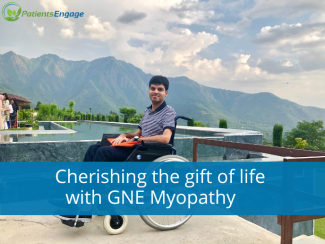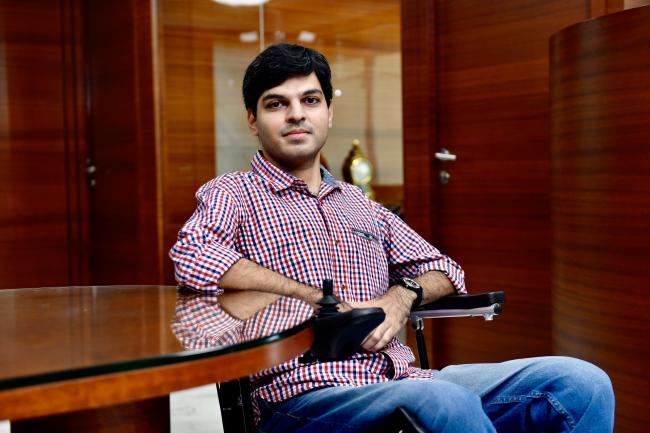
Says Rushabh Desai, 34, an investment adviser, who has been living with rare genetic disorder GNE Myopathy for the last 16 years. Here he shares his thoughts on the importance of being financially and emotionally independent and empowering oneself with perseverance and passion.
Could you tell us a little bit about yourself and your work?
I was born in Ahmedabad and raised in Mumbai. Along with living a life with GNE Myopathy I run a full-fledged investment services firm of my own called Rupee With Rushabh Investment Services. Just like any other person I have hobbies, dreams, aspirations and the desire to grow in life both at the personal and professional levels.
You are a financial entrepreneur – When and how did you venture out on your own?
I started my career in the middle of the global financial crises back in 2008 where I was working in a financial services company. This was the same time where GNE Myopathy had already begun in my body which I was completely unaware of. Coming from a business-oriented background I’ve always wanted to do something of my own. I came in this field by chance but the aspiration to be financially and emotionally independent, the passion I had towards financial planning and wealth creation and to help others achieve their financial goals led me to start my own venture in 2018.

At what age were you diagnosed with GNE myopathy? Were you studying at that time?
I knew that there was something unusual in my walking pattern while I was studying towards the end of my university years. After visiting a lot of doctors during the last year of my graduation I went through a muscle biopsy. Unfortunately I was misdiagnosed. After going through another muscle biopsy, the official diagnostic results came after my graduation year when I was around 21-22 years of age.
The common symptoms of GNEM are generally tripping, gait disturbance, inability to lift toes, or foot drop. What were your early symptoms?
It all started with mild weakness in lifting toes followed by mild foot dropping and muscle weakness in different parts of my lower limbs minus the quadriceps which were spared.
Did you experience any muscle weakness from childhood?
It was shocking for me and hard to digest when I came to know that I have a rare muscle disorder called GNE Myopathy because I was physically very active during my childhood and teenage years.
Did it take long for you to get the correct or confirmed diagnosis of GNE Myopathy?
It did take some time but luckily it didn’t take very long to get my correct diagnosis. We took multiple doctors’ opinions and didn’t rely on just one institute for my diagnosis. Unfortunately, I was misdiagnosed in India and had to go abroad to get my correct diagnosis done.
GNEM is a rare progressively chronic weakening illness. How did you become familiar with the disease? What was the biggest fear you had in accepting your condition?
The weakness in every GNEM patient is different. This is a slow progressive disorder so practically every day is a new day for me. Taking GNEM one day at a time and listening to my body was the only way to get familiar with this disorder. There were multiple fears in accepting my condition, one of them was what would happen when I lose 100% mobility in both my upper and lower body since GNEM affects all the exoskeletal muscles of the body. It has taken me a long time to come to acceptance with this disorder, although it is very difficult to accept every aspect of GNEM completely and it still runs in the back of my mind as my muscles are still deteriorating.
Being a genetic disorder, is there anyone else in the family affected by the disease?
There is no one officially diagnosed with GNE Myopathy that I know of in my family apart from myself.
Who is there to help you at home?
I have a full-time caregiver who helps me with all of my day-to-day activities and routine.
Has your family been supportive through this journey?
Unfortunately, my family has not been very supportive during the course of this journey. I didn’t get the right support and understanding from my family towards my challenges, feelings and the needs pertaining this disorder.
What are the challenges you face in your day-to-day activities because of GNEM?
When you have a muscle wasting disorder affecting both your upper and lower body the challenges are endless. I have reached a stage where I can no longer walk and can’t even raise my hands above my shoulders. My hands and legs have become very weak so right from getting in and out of bed, wearing clothes, shifting in the bathroom, getting in and out of my car etc. are a few major challenges I face on a day-to-day basis as I cannot do these things on my own and require help for it.
How have you adapted to your disability? Have you made changes in the house?
My infrastructure is not very disabled friendly. When you don’t have a choice, however difficult your surroundings, infrastructure and disability are you have to adapt to it. Luckily, I do have a trained caregiver who helps me with my day-to-day activities.
Do you do something for muscle relaxation? Any adaptive exercises that could strengthen muscles?
I do physiotherapy thrice a week and have been religiously doing it since the beginning. In my case this is not going to improve and reverse my condition but it is very important to keep the muscles well maintained. A combination of simple actively assisted exercises against the gravity and a good amount of stretching has worked out well for me. Physiotherapy has helped me tremendously in keeping my muscles active, relaxed and in slowing doing the deterioration process to some extent.
What are your hobbies? What do you do when you are not working?
Currently my work occupies most of my time and I love what I do but apart from work I would love to travel and swim. Being close to nature, exploring history and culture, indulging in different cuisines, meeting new people, doing outdoor sports and activities is something that I would thoroughly enjoy doing. And at home I love watching new and interesting content.
How has your lifestyle and condition changed since your diagnosis to now?
A lot has changed since my diagnosis. It’s been around 16 years living with GNE Myopathy since it’s onset before my official diagnosis and to describe this journey in a few words or sentences will be very hard. Right from been able to walk without any support, from using AFOs (ankle-foot orthoses), a stick, a rollator and now a wheelchair has been a long and challenging journey both physically and emotionally. Going ahead a lot is still going to change but the one thing I have refused and will refuse to change is my attitude to fully cherish the gift of life to the best of my capacity.

What are your dreams for yourself and for others in similar situations?
I have many dreams and aspirations but there are three in particular for which I feel strongly about and have seen for myself and others in this situation.
- Being financially and emotionally independent – In this self-centred and hypocritical world being dependent is like giving away the remote of your life to someone else which will surely be misused at some point. If you want to live your life on your own terms it is very important to be financially and emotionally independent, remember if you don’t help yourself no one is going to help you.
- Disability is not a bad word and is not a stigma – It is high time persons with disabilities are considered as an asset and not a liability in the society. We deserve everything that an able body person deserves like dignity, respect, job, love, marriage etc.
- Accessibility of quality infrastructure – If India wants to become a truly developed nation it cannot afford to exclude persons with disabilities. Having quality accessibility to health infrastructure and having wheelchair/disability accessible infrastructure is of utmost importance and the basic need of persons with disabilities. Like it or not today quality health care and wheelchair/disability infrastructure accessibility in India is still way behind than many other economies.
How do you think there can be greater empowerment of people living with GNEM?
Empowering and motivating yourself to do something in life should come from within. The best way to empower yourself is to be financially and emotionally independent. Along with hard work I strongly believe luck and surroundings play a very important role but in life regardless of your situation you have to keep on trying and working hard towards your goals and empowering yourself. Life is easy for some and difficult for others. You can’t control luck so focus on the things that you can control that is to work with patience, perseverance, determination, passion and focus. Remember, however difficult life may seem there is always something you can do and succeed at. Where there is life there is hope.






